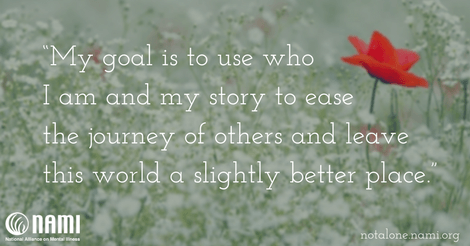July 27, 2017
By Alexandra Georgas

When Mom first told me that Dad was in the Mafia, having an affair and bugging our phones, I told myself it was true, although anxious doubts lived in my gut no matter how much I tried to force down the unreal truths.
I was a tween; in-between the childhood years of accepting Mom’s word as gospel and the teen years of questioning her every word. Mom had been loving, caring, giving and well-tended to me. The thought that her mind was no longer working properly was one that I fought to keep out of my mind.
But over time, my thin denial bubble was popped after Mom’s delusions deepened and widened. Her psychosis progressed as she was hearing voices, believing she had cancer and only months to live, and fantasies about a man she knew from high school playing music for her on the radio. I could no longer deny that she was disturbed. And as a result, so was I.
Mom divorced Dad, won me in the divorce, and I won the prize of losing my home and living in an apartment with a lady who had Mom’s face but was no longer her.
I wanted her back. My elaborate, teenage, emotional arguments were met with Mom slamming her bedroom door in my face. After months of complete inefficacy, and watching Mom quit job after job because the people at each place “were trying to kill” her, I withdrew into my own world. I became numb emotionally. I had no energy to be upset anymore. I got a job, made my own meals, got my own clothes, and just took care of myself as best as a kid can.
After three years of daily stress, denied feelings and emotional abandonment, Mom abandoned me physically. She left me alone in the apartment. Dad finally came through and had me move in with him literally on the day Mom disappeared. I was freed and truly elated.
Mom called me a week later when she returned. She had gone on vacation to Florida with her boyfriend. Hadn’t even left a note, let alone any cash. Mom had been such a present mother when I was a child. But now, she didn’t even think to let her kid know she was leaving the state for a week. That is the cloud of mental illness. Thinking is severely impaired by a devastating and deluding brain disorder.
A month later, Mom overdosed on alcohol. Three years later she attempted suicide twice, and, thankfully, was not successful. The social worker at the mental health facility where she landed gave me the diagnosis: schizophrenia. It took six years from obvious symptom onset before I knew what this thing was. Six years of suffering for Mom and me.
Mom’s suicide attempts rattled me emotionally and intensified my fear for her well-being. I cancelled a lot of my life in order to attempt to control her uncontrollable life. While other girls were focused on boys and tending to their own interests, my Saturday days and nights consisted of taking Mother to wherever she wanted to go trying to meet her every need. In attempt to give her a happy life, I denied my own.
At age 29 I finally saw that I needed healing. I found an outstanding counselor who helped me to separate emotionally from Mom. I also grieved what I had lost when Mom changed, learned to express the emotions I had stuffed down under emotional concrete blocks, and gave myself permission to live my own life. I let go of trying to fix and control Mom and her illness.
Mom was living in a nursing home by this time and medication compliant, but would not leave that home without me as her escort. After I stopped spending all my weekends with her, Mom faced her fears and learned to get her needs met without me. Cutting the emotional cord of fear freed both of us.
When I turned 38, I married a kind man who gave me the love I always desired. And Mom was there at my wedding, being my mom, welcoming and celebrating her only daughter’s new love.
Today, Mom is 80 years old. She has not had any psychotic symptoms in several decades, although she does have limited ability to focus and avoids anything stressful in order to keep herself calm. But overall, she is doing great.
As part of my recovery, I learned as much as I could about schizophrenia, which further deepened my compassion for those with mental health conditions and their loved ones. I now speak about the resources available from NAMI at a local hospital and teach the NAMI Family-to-Family class. I also support and volunteer for several other mental health agencies, which help to provide housing for those with disabilities. My goal is to use who I am and my story to ease the journey of others and leave this world a slightly better place. Partnering with NAMI, we can and we will.
Submit To The NAMI Blog
We’re always accepting submissions to the NAMI Blog! We feature the latest research, stories of recovery, ways to end stigma and strategies for living well with mental illness. Most importantly: We feature your voices.
LEARN MORE